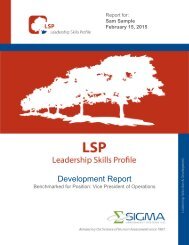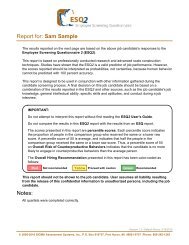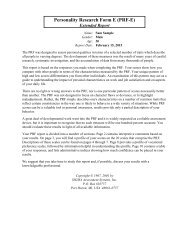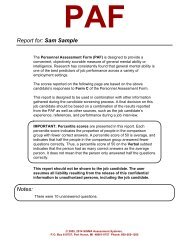Jackson Vocational Interest Survey (JVIS) - Sigma Assessment ...
Jackson Vocational Interest Survey (JVIS) - Sigma Assessment ...
Jackson Vocational Interest Survey (JVIS) - Sigma Assessment ...
You also want an ePaper? Increase the reach of your titles
YUMPU automatically turns print PDFs into web optimized ePapers that Google loves.
<strong>Jackson</strong> <strong>Vocational</strong> <strong>Interest</strong> <strong>Survey</strong> (<strong>JVIS</strong>)<br />
Extended Report<br />
Name: Sam Sample<br />
Gender: Male<br />
Report Date: February 15, 2015<br />
This report is based on your answers to the <strong>Jackson</strong> <strong>Vocational</strong> <strong>Interest</strong> <strong>Survey</strong> (<strong>JVIS</strong>). It outlines your areas of<br />
interest, and how your interests compare with those of people in different occupations and educational programs.<br />
It is extremely important to recognize that interests are different from abilities. These results tell you only about<br />
your interests. They do not indicate whether or not you have the ability, skill, or educational background<br />
necessary to do a particular kind of work. Thus, a high score on the Mathematics scale would indicate an interest<br />
in using mathematical reasoning to solve problems, but would not necessarily mean that you have the ability to<br />
become a mathematician. Other sources of information, as well as your past record of performance, should be<br />
considered in addition to your <strong>JVIS</strong> results.<br />
Most people find their vocational interest results very useful. However, you should not expect this report to<br />
choose a career for you without some careful thinking on your part. Results quite often turn out to be what you<br />
expected. If so, it is of some benefit to know that an objective comparison of your interests to those of others<br />
confirms the direction of your present planning. If this report suggests career directions very different from your<br />
present plans, you should carefully review these plans and your reasons for making them. Generally, people are<br />
more likely to be satisfied in an occupational area to which their interests are similar.<br />
You are encouraged to find out more about specific occupations in the areas to which your interests are similar.<br />
This report lists several possible activities and resources to get you started.<br />
The information in your <strong>JVIS</strong> report is arranged as follows<br />
<strong>JVIS</strong> Basic <strong>Interest</strong> Profile: Page 2<br />
General Occupational Themes: Page 5<br />
Academic Satisfaction: Page 7<br />
Similarity to College Students: Page 8<br />
Similarity to Job Groups: Page 9<br />
Where to Go From Here: Page 13<br />
Administrative Indices: Page 14<br />
Copyright © 1977 - 2012 by<br />
SIGMA <strong>Assessment</strong> Systems, Inc.<br />
P.O. Box 610757<br />
Port Huron, MI, USA 48061-0757
<strong>JVIS</strong> Extended Report Date: February 15, 2015 Page: 2<br />
Report for Sam Sample<br />
<strong>JVIS</strong> Basic <strong>Interest</strong> Profile<br />
Your Basic <strong>Interest</strong>s are reported below and represent your areas of interest and your preferences for 34 work<br />
roles and work styles. Use your list of Basic <strong>Interest</strong>s to learn what types of job-related activities you would most<br />
enjoy and what types of activities aren’t very interesting to you.<br />
Your Combined (Comb) percentile scores are reported below and show how your interests compare with the<br />
interests of other males and females who have taken the <strong>JVIS</strong>. The scores represent the percentage of people who<br />
scored lower than you did on that interest. Longer bars indicate your strongest interests and shorter bars indicate<br />
low interests. The scores in the Male (M) a n d Female (F) columns show how you compare to just the males and<br />
just the females in our <strong>JVIS</strong> sample group. Use these profiles to explore how you compare to your gender group.<br />
Work Roles describe preferences for activities associated with certain occupations. Work Styles describe<br />
preferences for certain types of work environments.<br />
Work Roles<br />
Combined Percentile Score<br />
Raw Percentiles Low Average High<br />
Basic <strong>Interest</strong> Score F M Comb. 0 20 40 60 80 99<br />
Nature-Agriculture 17 99 99 99<br />
Family Activity 16 95 98 96<br />
Adventure 17 97 92 95<br />
Engineering 14 99 88 95<br />
Sales 12 86 86 86<br />
Personal Service 12 79 92 84<br />
Office Work 10 73 82 76<br />
Life Science 10 76 69 73<br />
Performing Arts 11 69 69 69<br />
Business 10 54 62 58<br />
Skilled Trades 6 69 50 58<br />
Creative Arts 9 50 58 54<br />
Dominant Leadership 7 58 38 46<br />
Finance 8 54 42 46<br />
Physical Science 6 58 31 42<br />
Human Relations Mgt. 8 31 38 34<br />
Social Service 7 16 54 34<br />
Elementary Education 7 16 46 31<br />
Social Science 7 27 31 31<br />
Teaching 7 18 42 31<br />
Mathematics 3 34 18 27<br />
Technical Writing 5 21 31 24<br />
Professional Advising 7 18 24 21<br />
Author-Journalism 6 14 24 18<br />
Law 6 16 18 18<br />
Supervision 6 18 18 18<br />
Medical Service 1 14 8 12<br />
Work Styles<br />
Combined Percentile Score<br />
Raw Percentiles Low Average High<br />
Basic <strong>Interest</strong> Score F M Comb. 0 20 40 60 80 99<br />
Job Security 12 86 86 86<br />
Accountability 11 62 62 62<br />
Independence 8 24 24 24<br />
Interpersonal Confidence 9 10 21 16<br />
Stamina 6 18 14 16<br />
Planfulness 5 10 12 10<br />
Academic Achievement 3 1 3 2<br />
Each of the names in the Basic <strong>Interest</strong> column represents an area of interest. See the next two pages for more information<br />
about each area of interest.
<strong>JVIS</strong> Extended Report Date: February 15, 2015 Page: 3<br />
Report for Sam Sample<br />
Basic <strong>Interest</strong> Scale Descriptions<br />
Scale<br />
Description<br />
Academic Achievement<br />
Accountability<br />
Adventure<br />
Author-Journalism<br />
Business<br />
Creative Arts<br />
Dominant Leadership<br />
Elementary Education<br />
Engineering<br />
Family Activity<br />
Finance<br />
Human Relations Mgt.<br />
Independence<br />
Interpersonal Confidence<br />
Job Security<br />
Law<br />
Life Science<br />
Is interested in scholarly activities, particularly of a verbal nature. Reports<br />
systematic study habits.<br />
Reports a preference for working environments requiring a high degree of integrity<br />
a n d traditional virtues.<br />
Enjoys novel situations; seeks out the unusual or dangerous.<br />
Likes to be creative and original in writing; enjoys writing for a general audience.<br />
<strong>Interest</strong>ed in the day-to-day functioning of business and commercial organizations.<br />
<strong>Interest</strong>ed in arranging materials in an aesthetically pleasing manner; enjoys being<br />
creative and original in the applied or fine arts, for example in music, drawing or<br />
decorating.<br />
Prefers a forceful aggressive style of leadership. Enjoys a position of authority in<br />
which active, direct supervision and criticism of the work of others is involved.<br />
Enjoys teaching or caring for young children.<br />
<strong>Interest</strong>ed in the designing, testing or manufacturing of a wide variety of products;<br />
applies scientific principles to the solution of practical problems.<br />
Enjoys domestic activities, likes to take an active part in family life and child care,<br />
in decorating and caring for a home and garden, entertaining guests, and related<br />
activities.<br />
<strong>Interest</strong>ed in meeting the financial needs of the public, in solving financial problems,<br />
and in investment and trade.<br />
Enjoys acting as "the person in the middle" between people in conflict; enjoys<br />
r e s o l v i n g interpersonal situations, including those which are difficult or emotionally<br />
charged.<br />
Prefers working in an environment free from restraints and close supervision. Feels<br />
conf ined by rules and regulations. Would rather find own solutions to problems than<br />
seek advice from others.<br />
Prefers a working environment requiring a high degree of self-assurance in dealings<br />
with others. Reports not being afraid of meeting strangers and speaking with<br />
confidence about a variety of topics. Believes in own ability to accomplish most<br />
interpersonal tasks undertaken.<br />
Prefers a job with a definite and predictable future. Avoids taking social or<br />
economic risks on the job.<br />
<strong>Interest</strong>ed in legal matters.<br />
<strong>Interest</strong>ed in investigating various aspects of living organisms.
<strong>JVIS</strong> Extended Report Date: February 15, 2015 Page: 4<br />
Report for Sam Sample<br />
Basic <strong>Interest</strong> Scale Descriptions (continued)<br />
Scale<br />
Description<br />
Mathematics<br />
Medical Service<br />
Nature-Agriculture<br />
Office Work<br />
Performing Arts<br />
Personal Service<br />
Physical Science<br />
Planfulness<br />
Professional Advising<br />
Sales<br />
Skilled Trades<br />
Social Science<br />
Social Service<br />
Stamina<br />
Supervision<br />
Teaching<br />
Technical Writing<br />
Enjoys working with mathematical formulas and quantitative concepts; interested in<br />
per f or ming computations and in planning and applying mathematical methods to the<br />
solution of problems.<br />
<strong>Interest</strong>ed in working toward promoting health and curing disease in individuals.<br />
Likes to work outdoors with animals or plants.<br />
<strong>Interest</strong>ed in clerical work and in activities involving detail, usually in a business<br />
context.<br />
Enjoys performing for an audience.<br />
Enjoys providing direct services to individuals, e.g., travel guide or cosmetician.<br />
<strong>Interest</strong>ed in the systematic investigation of various aspects of nonliving nature, for<br />
e x a m p l e , chemistry, physics, geology or astronomy.<br />
Is organized in work habits and prefers working in an environment in which<br />
activities occur in an expected sequence.<br />
Enjoys counseling and giving expert advice.<br />
<strong>Interest</strong>ed in selling; likes to work with and to attempt to influence other people.<br />
Prefers working with hands or with machines, usually in making or repairing some<br />
product.<br />
<strong>Interest</strong>ed in investigating and learning about various aspects of the organization of<br />
s o c i e t y , human behavior, and social interaction.<br />
<strong>Interest</strong>ed in helping troubled people cope with their problems.<br />
Reports a willingness to work at a task for long hours without rest. Perseveres in the<br />
face of difficulty. Is likely to be challenged by difficult, involved assignments.<br />
<strong>Interest</strong>ed in planning, organizing and coordinating the activities of others. Enjoys<br />
holding a position of managerial responsibility.<br />
<strong>Interest</strong>ed in teaching a specific subject.<br />
Enjoys writing detailed, factual reports, manuals, or essays about scientific,<br />
technical, legal, or historical matters.
<strong>JVIS</strong> Extended Report Date: February 15, 2015 Page: 5<br />
Report for Sam Sample<br />
General Occupational Themes<br />
Studies with the <strong>JVIS</strong> have revealed 10 general patterns of interest. These patterns reflect general orientations to<br />
the world of work, rather than specific interests in particular areas. Your scores on these 10 General Occupational<br />
Themes are plotted below.<br />
Male Percentile Score<br />
Percentiles Low Average High<br />
Theme Female Male 0 20 40 60 80 99<br />
Practical 95 95<br />
Conventional 62 66<br />
Expressive 50 58<br />
Helping 12 46<br />
Logical 79 46<br />
Enterprising 31 34<br />
Socialized 38 34<br />
Inquiring 31 27<br />
Assertive 18 16<br />
Communicative 4 8<br />
. . . . . .<br />
. . . . . .<br />
. . . . . .<br />
. . . . . .<br />
. . . . . .<br />
. . . . . .<br />
. . . . . .<br />
. . . . . .<br />
. . . . . .<br />
Descriptions of each of the themes in the Them e column can be found on the following pages. The two Pe r c e n t i l e columns<br />
compare your General Occupational Theme scores to the females, and then the males, in a large group of students and young<br />
adults. Each percentile score is the percentage of people that received a score less than yours. The bars at the right illustrate<br />
how your General Occupational Theme scores compare to people of your own sex.
<strong>JVIS</strong> Extended Report Date: February 15, 2015 Page: 6<br />
Report for Sam Sample<br />
General Occupational Theme Descriptions<br />
Theme<br />
Assertive<br />
Communicative<br />
Conventional<br />
Enterprising<br />
Expressive<br />
Helping<br />
Description<br />
A high score on this theme may indicate a preference for working in situations in which you<br />
can exercise control, and where your authority is clearly defined. You may enjoy exercising<br />
authority over others, and will do so self-confidently, without the need to seek advice or<br />
assistance. High scorers may sometimes be seen as outspoken and direct with others, and will<br />
enjoy working with others, especially in a dominant role. People working in environments,<br />
such as the military, where this style of leadership is appropriate, frequently receive high<br />
scores on this theme.<br />
If you scored high on this theme, you will tend to be interested in ideas and in communicating<br />
thes e ideas to others. You are likely to enjoy serious expressions of thoughts, reading,<br />
attending lectures, studying, or engaging in intellectual discussions. Your enjoyment of<br />
communication may focus more on the formulation and expression of concepts than on the<br />
entertainment of others. High scorers tend to be described as intellectual, articulate, and<br />
well-informed, having a broad range of interests. Professional writers score highly on this<br />
theme. However, since communication is important in a wide range of occupations, many<br />
others score highly as well.<br />
If your score on this theme is high, you may prefer a well-defined role in a business or other<br />
larger organization. You will likely enjoy the day-to-day operations of a business, such as<br />
operating an office, selling products, making decisions, and supervising others. You may<br />
p r e f e r working in a smoothly running organization to working in a highly-charged or variable<br />
environment. You may also thrive on detail, preferring not to be required to be highly<br />
creative, nor to work at tasks involving mechanical skill, discomfort, or physical risk.<br />
Scoring high on this theme indicates that you will likely enjoy work involving talking with<br />
other s , especially if the purpose of that discussion is to persuade or influence. Self-confident,<br />
rarely shy in difficult situations, dominant, forceful; high scorers are usually interested in the<br />
mar keting or management aspects of business, rather than in the details of daily operation or<br />
in particular specialties. They are often motivated by the conventional symbols of social status<br />
-- money, influence and prestige -- rather than by other forms of recognition. In addition to<br />
bus ines s , high scorers can be found in the legal profession, administration, public relations,<br />
diplomacy, and related areas.<br />
If you scored high on this theme, you will likely be considered artistic by others, even if you<br />
are not presently engaged in any artistic work. You will likely enjoy creative activities such as<br />
drama, music, writing, visual art, or any of the applied or fine arts. You will also enjoy the<br />
creative work of others. High scorers tend to consider themselves perceptive, inventive,<br />
sensitive, imaginative, and aware of their environments. People in the arts receive high scores<br />
on this theme, but many others combine this theme with others in finding expression for their<br />
interests.<br />
People with high scores on this theme express a genuine concern for others, particularly those<br />
with problems or requiring assistance. High scorers enjoy social interaction, giving advice,<br />
and may be described as benevolent, comforting, sympathetic, supporting, charitable,<br />
as s is ting and cooperative. If you scored high on this theme, consider occupations in which<br />
you may take a direct role in helping, serving or teaching others.
<strong>JVIS</strong> Extended Report Date: February 15, 2015 Page: 7<br />
Report for Sam Sample<br />
General Occupational Theme Descriptions<br />
( Co n t i n u e d )<br />
Theme<br />
Inquiring<br />
Logical<br />
Practical<br />
Socialized<br />
Description<br />
A high score on this theme indicates that you have a great deal of curiosity about your<br />
envir onment, living things, other people and social institutions. You have a desire to learn<br />
about many areas of knowledge, and may be described as investigative, intellectually probing,<br />
a n d reflective. Consider entering one of the social or biological sciences, one of the<br />
professions, or combine this theme with others when choosing a career.<br />
High scorers enjoy rational abstract thought that is characterized by testable generalizations,<br />
deductive reasoning, and precision. They enjoy the challenge of difficult intellectual work,<br />
particularly in the areas of mathematics and physical sciences, and in applications such as<br />
engineering, work with computers, as well as a variety of other areas where quantitative and<br />
exacting work is required. If you scored high on this theme, you may prefer working with the<br />
physical world and abstract ideas to working primarily with people.<br />
If you scored high on this theme, you are likely to enjoy activities requiring physical or<br />
mechanical skill -- seeking satisfaction from the quality of your work, rather than from<br />
exer cis ing influence or power over others. You are also likely to enjoy outdoor work and not<br />
to be overly concerned about physical risks. You may tend to avoid activities that require you<br />
to be the center of attention, and may prefer practical arts to the world of abstract ideas. You<br />
are also likely to enjoy close family ties and may enjoy arranging for the comfort and<br />
well-being of others. High scorers can be found in a wide variety of activities, such as<br />
agriculture, skilled trades, and service occupations.<br />
If you scored high on this theme, you are likely to be regarded as a responsible, stable worker<br />
-- disciplined, prompt, systematic and deliberate, but not usually creative. You would rather<br />
b e confident about a relatively certain future at a predictable salary, than accept the<br />
un c er ta in ty of a riskier but possibly more rewarding prospect. You will likely favor<br />
occupations that offer stability and reward traditional virtues.<br />
Academic Satisfaction<br />
Your Academic Satisfaction score reflects the degree of similarity between your profile and that of an average<br />
university student who is engaged in a traditional academic and/or scientific course of study. It is not a measure<br />
of your ability to do university level work, nor can it predict your success as a university student. Instead, it<br />
provides an indication of the degree to which you might enjoy scholarly activities such as serious reading,<br />
studying, doing research and assignments, etc.<br />
Percentile<br />
Score %ile 0 20 40 60 80 99<br />
Academic Satisfaction 421 21<br />
The average score is 500. Approximately two thirds of high school and college students score between 400 and 600. The<br />
percentile figure and bar graph show you the percentage of a large group of students that received a score lower than yours.
<strong>JVIS</strong> Extended Report Date: February 15, 2015 Page: 8<br />
Report for Sam Sample<br />
Similarity to College Students<br />
<strong>JVIS</strong> profiles from over 10,000 university students who were enrolled in more than 150 different major fields,<br />
ranging from accounting to zoology, have been collected and analyzed. That analysis indicated that the major<br />
fields could be classed into 17 broad academic clusters. Each cluster is based on data from both males and<br />
females and represents a set of educational majors that shared a similar pattern of <strong>JVIS</strong> scores.<br />
The chart below ranks the similarity of your <strong>JVIS</strong> Basic <strong>Interest</strong> profile to each of the student clusters. A high<br />
score indicates that your pattern of interests is similar to students in the fields of concentration defining the<br />
cluster, while a low score indicates dissimilarity. These scores indicate your probable interest and satisfaction<br />
with these academic clusters. These scores do not tell you whether or not you will be successful in any particular<br />
field.<br />
Score Similarity University Major Cluster<br />
+0.62 Very Similar Environmental Resource Management<br />
+0.55 Similar Health, Physical Education and Recreation<br />
+0.39 Moderately Similar Agribusiness and Economics<br />
+0.37 Moderately Similar Art and Architecture<br />
+0.30 Moderately Similar Food Science<br />
+0.12 Neutral Engineering<br />
+0.03 Neutral Science<br />
-0.03 Neutral Computer Science<br />
-0.08 Neutral Performing Arts<br />
-0.12 Neutral Social Service<br />
-0.12 Neutral Health Services and Science<br />
-0.19 Neutral Mathematical Sciences<br />
-0.25 Neutral Business<br />
-0.25 Dissimilar Communication Arts<br />
-0.30 Dissimilar Behavioral Science<br />
-0.32 Dissimilar Education<br />
-0.54 Dissimilar Social Science, Law and Politics<br />
Your <strong>JVIS</strong> profile is most similar to college students whose academic areas of specialization are in the three<br />
clusters listed below. Sample majors for each of these three areas are also listed.<br />
University Major Cluster<br />
Environmental Resource Management<br />
Sample Majors<br />
Wildlife Technology, Recreation and Parks, Environmental Resource<br />
Management, Agricultural Business Management, Agriculture, Forest<br />
Science and Technology, Horticulture.<br />
Health, Physical Education and Recreation Health and Physical Education, Recreation and Parks.<br />
Agribusiness and Economics<br />
Agricultural Economics and Rural Sociology, Agricultural Business<br />
Management, Food Service and Housing Administration.
<strong>JVIS</strong> Extended Report Date: February 15, 2015 Page: 9<br />
Report for Sam Sample<br />
Similarity to Job Groups<br />
Ranked below is the similarity of your <strong>JVIS</strong> Basic <strong>Interest</strong> profile to the interests of people working in 32 job<br />
groups. A positive score indicates that your profile shows some degree of similarity to those already in the job<br />
cluster, while a negative score indicates dissimilarity.<br />
Score Similarity Job Group<br />
+0.61 Very Similar Agriculturalists<br />
+0.53 Similar Construction/Skilled Trades<br />
+0.35 Moderately Similar Machining/Mechanical and Related Occupations<br />
+0.34 Moderately Similar Occupations in Fine Art<br />
+0.31 Moderately Similar Service Occupations<br />
+0.30 Moderately Similar Occupations in Life Sciences<br />
+0.28 Moderately Similar Sport and Recreation Occupations<br />
+0.28 Moderately Similar Occupations in Commercial Art<br />
+0.28 Moderately Similar Protective Services Occupations<br />
+0.23 Neutral Health Service Workers<br />
+0.19 Neutral Medical Diagnosis and Treatment Occupations<br />
+0.18 Neutral Assembly Occupations-Instruments and Small Products<br />
+0.17 Neutral Occupations in Music<br />
+0.13 Neutral Engineering and Technical Support Workers<br />
+0.10 Neutral Occupations in Entertainment<br />
+0.10 Neutral Occupations in the Physical Sciences<br />
+0.09 Neutral Occupations in Computer Science<br />
-0.03 Neutral Mathematical and Related Occupations<br />
-0.05 Neutral Occupations in Pre-school and Elementary Teaching<br />
-0.07 Neutral Clerical Services<br />
-0.09 Neutral Occupations in Merchandising<br />
-0.13 Neutral Sales Occupations<br />
-0.14 Neutral Teaching and Related Occupations<br />
-0.18 Neutral Occupations in Accounting, Banking and Finance<br />
-0.23 Neutral Occupations in Writing<br />
-0.30 Dissimilar Personnel/Human Management<br />
-0.35 Dissimilar Occupations in Religion<br />
-0.35 Dissimilar Administrative and Related Occupations<br />
-0.42 Dissimilar Occupations in Law and Politics<br />
-0.44 Dissimilar Counselors/Student Personnel Workers<br />
-0.55 Dissimilar Occupations in Social Science<br />
-0.59 Dissimilar Occupations in Social Welfare<br />
Descriptions, sample job titles and suggested activities for each of your three highest ranked job groups are presented on the<br />
next three pages. Remember, the ranking of these job groups reflects the similarity of your <strong>JVIS</strong> Basic <strong>Interest</strong> profile to those<br />
o f people employed in these areas. The ranking is not a reflection of your ability to perform any required duties or to benefit<br />
from training in these areas. You may find this information useful in planning your education and your career. Your counselor<br />
or adviser can be of help to you in this process.<br />
In the descriptions that follow, O*NET codes are listed along with sample job titles. O*NET offers a comprehensive<br />
classification of occupational titles and job categories that is based on the Standard Occupational Classification (SOC)<br />
s ys tem. Use these codes to locate additional information on the O*NET web site at http://www.onetonline.org. To find<br />
occupation descriptions and links to related jobs, enter either the O*NET/SOC code (for example 27.3043.04), the job title<br />
(for example copy writer) or a keyword (such as writer) within the given fields on the site. Additional information can be<br />
found in the suggested activities listed along with each of your top three job groups.
<strong>JVIS</strong> Extended Report Date: February 15, 2015 Page: 10<br />
Report for Sam Sample<br />
1. Agriculturalists<br />
This group of occupations relates to farming and/or raising animals. Individuals working on a farm or ranch<br />
would have a wide range of responsibilities, such as planting and harvesting crops, applying pesticides and<br />
fertilizers, feeding and taking care of livestock, and operating heavy machinery such as tractors. Individuals<br />
working in forestry manage forested lands for economic, recreational, and conservation purposes. An interest in<br />
animals might lead to becoming a Veterinarian or an Animal Breeder. People in this group typically score high on<br />
the Nature-Agriculture, Family Activity, Skilled Trades, Life Science, and Accountability scales of the <strong>JVIS</strong>.<br />
Listed below is a sample of some of the occupations available in this area. Both post-secondary education and<br />
on-the-job training is available for many of these jobs. To learn more about the occupations that make up this job<br />
group, search the complete O*NET listings at http://www.onetonline.org.<br />
O*Net Div. 11 - Management<br />
O*Net Div. 19 - Life, Physical, and Social Science<br />
O*Net Div. 29 - Healthcare Practitioners and Technical<br />
O*Net Div. 37 - Building and Grounds Cleaning and Maintenance<br />
O*Net Div. 45 - Farming, Fishing, and Forestry<br />
O*NET Code Job Title O*NET Code Job Title<br />
11-9013.01 Nursery & Greenhouse Manager 11-9013.02 Farm & Ranch Manager<br />
19-1031 Conservation Scientist 19-1031.03 Park Naturalist<br />
19-1032 Forester 19-4011.01 Agricultural Technician<br />
19-4093 Forest & Conservation Technician 19-4099.02 Precision Agriculture Technician<br />
29-1131 Veterinarian 37-3011 Landscaping & Groundskeeping Worker<br />
37-3013 Tree Trimmer & Pruner 45-2011 Agricultural Inspector<br />
45-2021 Animal Breeder 45-3011 Fisher<br />
Organizations<br />
1. American Fisheries Society. (www.fisheries.org)<br />
2. American Society of Agricultural & Biological Engineers. (www.asabe.org)<br />
3. American Society of Agronomy. (www.agronomy.org)<br />
4. American Veterinary Medical Association. (www.avma.org)<br />
5. Crop Science Society of America. (www.crops.org)<br />
6. National FFA Organization - Future Farmers of America. (www.ffa.org)<br />
7. Society of American Foresters. (www.safnet.org)<br />
8. Soil Science Society of America. (www.soils.org)<br />
9. Tree Care Industry Association. (www.treecareindustry.org)<br />
Activities<br />
1. Get hands-on experience working on a farm.<br />
2. Interview a local breeder.<br />
3. Learn more about growing plants in your own backyard by experimenting with various vegetable, herb, and floral<br />
gardens.<br />
4. Visit www.volunteer.gov to find volunteer opportunities at parks, forests, campgrounds or to get involved with natural<br />
resources.<br />
5. Visit a farm show or county fair.<br />
6. Visit farms specializing in dairy cattle, livestock, grain, or vegetable growing.<br />
7. Volunteer to help plant trees by visiting www.arborday.org.
<strong>JVIS</strong> Extended Report Date: February 15, 2015 Page: 11<br />
Report for Sam Sample<br />
2. Construction/Skilled Trades<br />
This job group includes a variety of occupations that are involved in the making, building, assembling, and<br />
repairing of products, buildings, roads, bridges, and machinery. Carpenters, Stonemasons, and Boilermakers, for<br />
example, may work with various materials, such as wood, stone, metal, and plastic. Individuals working in<br />
construction may use tools such as cement mixers and air hammers, and/or operate heavy machinery, such as<br />
bulldozers. People in these trades tend to show high scores in Skilled Trades, Engineering, Family Activity,<br />
Adventure, and Nature-Agriculture. Listed below is a sample of some of the occupations available in this area.<br />
Many of these jobs provide apprenticeships and on-the-job training. To learn more about the occupations that<br />
make up this job group, search the complete O*NET listings at http://www.onetonline.org.<br />
O*Net Div. 11 - Management<br />
O*Net Div. 47 - Construction and Extraction<br />
O*Net Div. 49 - Installation, Maintenance, and Repair<br />
O*Net Div. 51 - Production<br />
O*Net Div. 53 - Transportation and Material Moving<br />
O*NET Code Job Title O*NET Code Job Title<br />
11-9021 Construction Manager 47-2021 Brickmason & Blockmason<br />
47-2031 Carpenter 47-2041 Carpet Installer<br />
47-2061 Construction Laborer 47-2081 Drywall & Ceiling Tile Installer<br />
47-2111 Electrician 47-2141 Painter, Construction & Maintenance<br />
47-2152.02 Plumber 47-2161 Plasterer & Stucco Mason<br />
47-2181 Roofer 47-4011 Construction & Building Inspector<br />
49-9096 Rigger 51-7011 Cabinetmaker & Bench Carpenter<br />
53-7021 Crane & Tower Operator<br />
Organizations<br />
1. Associated Builders & Contractors. (www.abc.org)<br />
2. Association of Construction Inspectors. (www.aci-assoc.org)<br />
3. Independent Electrical Contractors. (www.ieci.org)<br />
4. International Association of Bridge, Structural, Ornamental & Reinforcing Iron Workers. (www.ironworkers.org)<br />
5. National Association of Home Builders. (www.nahb.org)<br />
6. National Roofing Contractors Association. (www.nrca.net)<br />
7. Painting & Decorating Contractors of America. (www.pdca.org)<br />
8. Plumbing-Heating-Cooling Contractors Association. (www.phccweb.org)<br />
9. The Flooring Contractors Association. (www.fcica.com)<br />
10. The Masonry Society. (www.masonrysociety.org)<br />
Activities<br />
1. Check out www.aecinfo.com for links to construction businesses, products, forums, news, resources, and more.<br />
2. Gain hands-on experience by getting a summer job doing construction work.<br />
3. Join a humanitarian organization such as Habitat for Humanity to help build houses for families in need. Visit<br />
www.habitat.org to get involved.<br />
4. Take a woodworking class.<br />
5. Volunteer to help a family member or a neighbor with painting, home renovations, and home repair and maintenance.
<strong>JVIS</strong> Extended Report Date: February 15, 2015 Page: 12<br />
Report for Sam Sample<br />
3. Machining/Mechanical and Related Occupations<br />
These occupations are concerned with the operating, controlling, and setting up of machines to cut, shape, and/or<br />
print such materials as metal, paper, wood, and stone. There are a wide variety of jobs in this field of<br />
mechanically oriented work, such as Tool and Die Maker, Machinist, Printer, and Electrician. People in this<br />
occupational group tend to have high interests in the <strong>JVIS</strong> areas of Skilled Trades, Engineering, Mathematics,<br />
Creative Arts, and Physical Science. Listed below is a sample of some of the occupations available in this area.<br />
Job training and apprenticeships are usually available on the job; however, some may require specialized training<br />
or education. To learn more about the occupations that make up this job group, search the complete O*NET<br />
listings at http://www.onetonline.org.<br />
O*Net Div. 11 - Management<br />
O*Net Div. 47 - Construction and Extraction<br />
O*Net Div. 49 - Installation, Maintenance, and Repair<br />
O*Net Div. 51 - Production<br />
O*NET Code Job Title O*NET Code Job Title<br />
11-3051 Industrial Production Manager 47-2111 Electrician<br />
49-3023.01 Automotive Master Mechanic 49-3052 Motorcycle Mechanic<br />
49-9021.01 Heating & Air Conditioning Mechanic & Installer<br />
49-9041 Industrial Machinery Mechanic 49-9044 Millwright<br />
49-9052 Telecommunications Line Installer & Repairer51-2041 Structural Metal Fabricator & Fitter<br />
51-4041 Machinist 51-4111 Tool & Die Maker<br />
51-4121.06 Welder, Cutter & Welder Fitter 51-5112 Printing Press Operator<br />
51-8021 Stationary Engineer & Boiler Operator<br />
Organizations<br />
1. American Welding Society. (www.aws.org)<br />
2. Automotive Service Association. (www.asashop.org)<br />
3. Engine Manufacturers Association. (www.enginemanufacturers.org)<br />
4. Mechanical Contractors Association of America. (www.mcaa.org)<br />
5. Millwright Employers Association. (http://millwrightemployers.org)<br />
6. National Tooling & Machining Association. (www.ntma.org)<br />
7. Precision Machined Products Association. (www.pmpa.org)<br />
8. Professional Lighting & Sound Association. (www.plasa.org)<br />
Activities<br />
1. Attend a machine tool show or another similar convention in your area.<br />
2. Check out the American Machinist online at www.americanmachinist.com for the latest industry news and other<br />
resources.<br />
3. Get hands-on experience and training by finding an apprenticeship in your field of interest.<br />
4. Look into co-op programs and other learning experiences that allow you to practice your skills.<br />
5. Take on a 'do-it-yourself' project in mechanics, installation, or repair under the supervision and guidance of someone<br />
knowledgeable in the area.<br />
6. Talk to a machine shop, metal working and fabricating, or mechanics teacher.<br />
7. Talk to a millwright, mould maker, tool and die maker, or a heavy manufacturer.<br />
8. Visit www.welding.com for welding industry news, services, and resources.
<strong>JVIS</strong> Extended Report Date: February 15, 2015 Page: 13<br />
Report for Sam Sample<br />
Where To Go From Here<br />
By completing a vocational interest instrument like the <strong>JVIS</strong>, you have taken the first step toward the thoughtful<br />
selection of your career. You have learned more about yourself, your vocational interests, and how they compare<br />
to people studying and working in a variety of career areas. However, in order to choose a career successfully,<br />
you will have to learn more about your areas of interest. Listed below are a variety of suggestions to help you<br />
explore your career options.<br />
Activities<br />
Use the general activities listed below to structure your career exploration process. These activities are patterned<br />
on a career exploration process outlined in the Career Exploration Guide which can be found at <strong>JVIS</strong>.COM.<br />
Gather Information About Yourself<br />
- Take a look at your school marks to see what subject areas are your strongest. See how your marks relate to your top<br />
job groups and make decisions accordingly.<br />
- Make a list of your physical, mental, interpersonal, informational, and practical skills. Look into how to improve the<br />
skills that relate to your career matches.<br />
- Make a list of the qualifications you have, e.g., courses, degrees, certificates, diplomas, and licenses. Check to see<br />
whether your qualifications match those required for the careers you are interested in, or what is involved in obtaining<br />
those you don't have.<br />
- Explore your values and beliefs and think about how they may affect your career decisions.<br />
- Consider how important public contact, compensation, opportunities for advancement, challenge, travel, working<br />
conditions, family responsibilities and hobbies are to you. Relate these preferences to your job groups.<br />
Gather Information About Careers<br />
- Check out the descriptions of occupations in your top three job groups and your other high job groups. Visit the<br />
Occupational Outlook Handbook at www.bls.gov/oco/ or the Occupational Information Network resource center at<br />
www.onetcenter.org.<br />
- Check out the official job site of the U.S. federal government for valuable employment information at<br />
www.usajobs.gov.<br />
- Research potential careers by googling job titles, career fields, and employers, or arrange informational interviews<br />
with people working in your field of interest.<br />
- Visit job fairs or employment agencies in your area to learn more about what companies are hiring and what positions<br />
related to your high job groups are currently in demand.<br />
- Watch videos on careertv.com to learn about different careers, companies, and job search techniques.<br />
- Read hard copy or online magazines that focus on career trends and issues as well as on industries that relate to your<br />
top occupational interests.<br />
- Find out what it is like to actually work in a certain occupation. Read interviews from people in careers that you may<br />
be interested in at pursuethepassion.jobing.com, or job shadow someone working in an occupation of interest.<br />
- Explore career resources, career links and industry information on the web at www.careeronestop.org.
<strong>JVIS</strong> Extended Report Date: February 15, 2015 Page: 14<br />
Report for Sam Sample<br />
Where To Go From Here (continued)<br />
Start Decision Making and Action Planning<br />
- Check out College and University Fairs to find schools that have programs that relate to your possible career paths.<br />
Search for suitable schools online at www.petersons.com and www.campusprogram.com.<br />
- Research ways to finance an education in the area that interests you. Visit www.fastweb.com and www.finaid.com for<br />
information on available scholarships and financial aid.<br />
- Take extra classes that relate to your potential career paths. Contact your local high schools, colleges, universities and<br />
private organizations for more information.<br />
- Attend Resume Writing and Interview Workshops or check out articles on www.monster.com to prepare yourself for<br />
job searching.<br />
- Get the work experience you need by being an intern in a position that matches your career interests. Visit<br />
www.internshipprograms.com for more information on internship possibilities.<br />
- Start searching online for jobs in your field to learn what positions local companies hire for. Check out<br />
www.monster.com, www.aftercollege.com or other job sites.<br />
Administrative Indices<br />
The following scores show how much confidence can be placed in your <strong>JVIS</strong> results. For most people, these<br />
scores fall in the normal range, indicating consistent and normal responses to the <strong>JVIS</strong>. If one of your scores falls<br />
outside the normal range, you should take a second look at your <strong>JVIS</strong> results. If you feel that your results do not<br />
reflect your true interests, you should talk to your counselor about redoing the <strong>JVIS</strong>.<br />
Count<br />
Unscorable Responses 0<br />
0 High<br />
Score Low Normal<br />
Response Consistency Index 0.64<br />
Score %ile Normal High<br />
Infrequency Index 18 76<br />
There were no unscorable responses. Both your Response Consistency Index and your Infrequency Index fall in<br />
the normal range, indicating that you responded consistently and that your responses fit a normal pattern.<br />
If you have any questions about these administrative indices and their impact on your <strong>JVIS</strong> results, please see<br />
your counselor.<br />
Copyright © 1977 - 2012, SIGMA <strong>Assessment</strong> Systems, Inc.
<strong>JVIS</strong> Summary Report Date: February 15, 2015 Page: 1<br />
Report for Sam Sample<br />
Work Roles<br />
<strong>JVIS</strong> Basic <strong>Interest</strong> Profile<br />
Combined Percentile Score<br />
Raw Percentiles Low Average High<br />
Basic <strong>Interest</strong> Score F M Comb. 0 20 40 60 80 99<br />
Nature-Agriculture 17 99 99 99<br />
Family Activity 16 95 98 96<br />
Adventure 17 97 92 95<br />
Engineering 14 99 88 95<br />
Sales 12 86 86 86<br />
Personal Service 12 79 92 84<br />
Office Work 10 73 82 76<br />
Life Science 10 76 69 73<br />
Performing Arts 11 69 69 69<br />
Business 10 54 62 58<br />
Skilled Trades 6 69 50 58<br />
Creative Arts 9 50 58 54<br />
Dominant Leadership 7 58 38 46<br />
Finance 8 54 42 46<br />
Physical Science 6 58 31 42<br />
Human Relations Mgt. 8 31 38 34<br />
Social Service 7 16 54 34<br />
Elementary Education 7 16 46 31<br />
Social Science 7 27 31 31<br />
Teaching 7 18 42 31<br />
Mathematics 3 34 18 27<br />
Technical Writing 5 21 31 24<br />
Professional Advising 7 18 24 21<br />
Author-Journalism 6 14 24 18<br />
Law 6 16 18 18<br />
Supervision 6 18 18 18<br />
Medical Service 1 14 8 12<br />
Work Styles<br />
Combined Percentile Score<br />
Raw Percentiles Low Average High<br />
Basic <strong>Interest</strong> Score F M Comb. 0 20 40 60 80 99<br />
Job Security 12 86 86 86<br />
Accountability 11 62 62 62<br />
Independence 8 24 24 24<br />
Interpersonal Confidence 9 10 21 16<br />
Stamina 6 18 14 16<br />
Planfulness 5 10 12 10<br />
Academic Achievement 3 1 3 2
<strong>JVIS</strong> Summary Report Date: February 15, 2015 Page: 2<br />
Report for Sam Sample<br />
General Occupational Themes<br />
Male Percentile Score<br />
Percentiles Low Average High<br />
Theme Female Male 0 20 40 60 80 99<br />
Practical 95 95<br />
Conventional 62 66<br />
Expressive 50 58<br />
Helping 12 46<br />
Logical 79 46<br />
Enterprising 31 34<br />
Socialized 38 34<br />
Inquiring 31 27<br />
Assertive 18 16<br />
Communicative 4 8<br />
. . . . . .<br />
. . . . . .<br />
. . . . . .<br />
. . . . . .<br />
. . . . . .<br />
. . . . . .<br />
. . . . . .<br />
. . . . . .<br />
. . . . . .<br />
Academic Satisfaction<br />
Percentile<br />
Score %ile 0 20 40 60 80 99<br />
Academic Satisfaction 421 21<br />
Similarity to College Students<br />
Score Similarity University Major Cluster<br />
+0.62 Very Similar Environmental Resource Management<br />
+0.55 Similar Health, Physical Education and Recreation<br />
+0.39 Moderately Similar Agribusiness and Economics<br />
Similarity to Job Groups<br />
Score Similarity Job Group<br />
+0.61 Very Similar Agriculturalists<br />
+0.53 Similar Construction/Skilled Trades<br />
+0.35 Moderately Similar Machining/Mechanical and Related Occupations<br />
Administrative Indices<br />
Count<br />
Unscorable Responses 0<br />
0 High<br />
Score Low Normal<br />
Response Consistency Index 0.64<br />
Score %ile Normal High<br />
Infrequency Index 18 76<br />
Copyright © 1977 - 2012, SIGMA <strong>Assessment</strong> Systems, Inc.
















